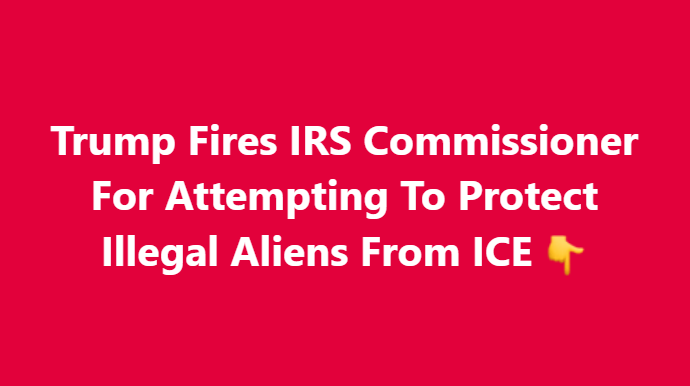The Trump administration has conveyed a definitive message: the protection of illegal immigrants from enforcement actions will not be accepted. Former IRS Commissioner Billy Long has been dismissed from his role after he declined to fully comply with the Department of Homeland Security’s (DHS) request to utilize taxpayer data to assist in locating tens of thousands of suspected illegal aliens.
The conflict escalated when DHS provided the IRS with a list of approximately 40,000 names believed to belong to individuals residing in the U.S. unlawfully. DHS requested that the IRS use confidential taxpayer information to confirm addresses. Alarmingly, the IRS verified fewer than 3% of the names — a shortcoming that Trump supporters interpret as obstructing a crucial immigration enforcement effort.
Long, a former congressman, remained steadfast, asserting that the IRS would only disclose information strictly within the limited scope of its existing agreements with DHS. This position directly contradicted a new directive from President Trump that significantly broadened ICE’s authority to request sensitive information to identify and deport illegal aliens.
Treasury Secretary Scott Bessent will now assume control of the IRS on an interim basis, with a new commissioner to be appointed shortly. In a carefully crafted statement, the Treasury Department expressed gratitude to Long for his service but did not disguise the fact that the administration is poised to pursue a different course — one that aligns more closely with the President’s assertive border enforcement strategy.
The termination occurs amid Trump’s extensive reform of the IRS. Within just six months, the agency’s workforce has been reduced by 25%, reversing Joe Biden’s $80 billion IRS expansion initiative. On the campaign trail, Trump pledged to curtail what many Americans perceive as one of the most unpopular and overreaching agencies in Washington — and he is following through on that promise.
The Treasury Inspector General for Tax Administration has detailed how the administration has been reducing the IRS through programs encouraging voluntary resignations, offers for early retirement, and incentives for separation. In April 2025, the agency initiated formal Reduction in Force (RIF) actions, indicating that the reductions are far from complete.
Supporters of Trump perceive the IRS overhaul as a dual triumph: dismantling an excessive bureaucracy while ensuring that taxpayer-funded agencies effectively enforce immigration laws rather than undermine them. Detractors — including the National Taxpayer Advocate — argue that the IRS requires additional personnel to operate effectively. However, for the administration, the focus is unmistakable: to create a more streamlined, accountable IRS that is prepared to aid in safeguarding American sovereignty.
The communication from the White House is unequivocal: under Trump, federal agencies are mandated to serve the American populace — which includes collaborating in the expulsion of individuals who have violated the nation’s immigration statutes. For Billy Long, opting for bureaucratic caution instead of taking decisive measures against illegal immigration turned out to be a career-ending error.



